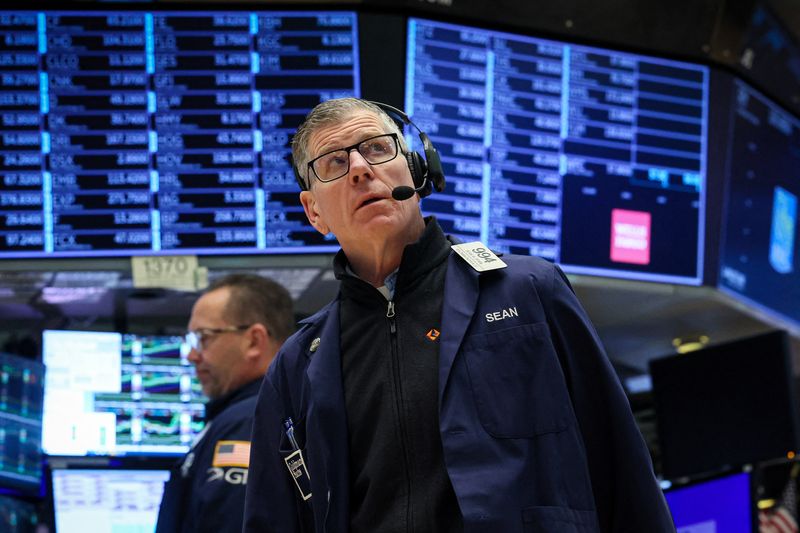Investing.com -- The S&P 500 reversed early-day gains to close Wednesday, as a slump in Super Micro Computer pressured chips stocks, weighing on the broader market.
At 16:00 ET (20:00 GMT), the Dow Jones Industrial Average fell 234 points, or 0.60%, the S&P 500 fell 0.7%, and the NASDAQ Composite fell 1%.
Super Micro Computer slump puts chips in crosshairs
Super Micro Computer (NASDAQ:SMCI) stock fell 20% after the data center operator's June quarter earnings missed estimates, raising more concerns over just how much demand the artificial intelligence industry was generating.
"SMCI's results disappointed, with management attributing the majority of the miss to an abrupt customer shift towards liquid cooled systems," Wedbush said, as the company was "unable to procure enough components to support an unexpectedly sharp customer shift towards liquid cooled servers."
The worries about slowing AI momentum sparked a wave of selling pressure across chip stocks, which fell 2%, with NVIDIA Corporation (NASDAQ:NVDA), Broadcom Inc (NASDAQ:AVGO) and Wolfspeed Inc (NYSE:WOLF) leading to the downside.
Weaker 10-year Treasury auction pushes yields higher
The U.S. government sold $42 billion of 10-year Treasuries on Wednesday at a higher-than-expected yield as demand eased.
The notes were awarded at 3.960%, 3.1 basis point above the expected yield, or when-issue rate, of 3.929%, but below the 4.276% high seen in the prior auction.
The weaker auction pushed Treasury yields higher, with 10-year Treasuries trading at 3.951%, up 6 basis points.
Energy stocks a bright spot as oil prices climb
Energy stocks led the market higher, underpinned by a jump in oil prices after data showed U.S. crude stocks fell more than expected in the week ended Aug. 2.
The Energy Information Administration reported Wednesday that U.S. crude stocks fell by 3.7M barrels in the week through Aug. 2., compared with estimates for a 1.6M barrel decline.
Targa Resources Inc (NYSE:TRGP), Williams Companies Inc (NYSE:WMB), and Devon Energy Corporation (NYSE:DVN) were among the top gainers with the latter also boosted by quarterly results that topped Wall Street estimates.
Walt Disney sees drop in park profits; Shopify (TSX:SHOP) soars, Airbnb falters on earnings stage
Walt Disney (NYSE:DIS) stock fell 4% after the entertainment giant reported a drop in profits at its Experiences segment that includes parks and consumer products, which makes up just over half of profit, even as its Entertainment unit, with the combined streaming businesses of Disney+, Hulu and ESPN+, posted a profit for the first time.
Shopify (NYSE:SHOP) shares soared nearly 18% after the e-commerce platform beat expectations for quarterly revenue, as its artificial intelligence-powered tools helped pull in more merchants to its e-commerce services.
Airbnb (NASDAQ:ABNB) stock fell 13% after the house rental company forecast third-quarter revenue below estimates and warned of shorter booking windows, suggesting travelers were waiting until the last minute to book due to economic uncertainty.
The resilience of S&P 500 earnings remains intact despite growing recession fears and recent negative price action, Citi strategists said in a Wednesday note.
The bank’s Citi Economic Data Change index, which summarizes US macro data trends, is indicating further deterioration for the U.S. economy.
But interestingly, while economic data was weak in 2022, S&P 500 earnings growth remained flat rather than severely negative, as rolling earnings recessions mitigated the overall index impact.
Overall, the strategists maintain confidence in their $250 EPS forecast for the S&P 500 in 2024, which is slightly higher than the current bottom-up consensus of around $243.
"But even that level of earnings, if not somewhat lower, would still represent significant improvement over 2023,” strategists argued.
“While not locked in by any means, with Q2 reports mostly behind and most corporates essentially halfway through Q3, we struggle to see earnings expectations moving materially lower than current consensus."
"The bigger issue will be with 2025 earnings should more pronounced macro slowing unfold during the remainder of this year. But, again, we expect more resilience versus history."
Market stress elevated
That said, sentiment towards risk-driven assets remained frail amid persistent concerns over slowing growth and middling earnings.
Goldman Sachs (NYSE:GS) noted that its Financial Stress Index (FSI) has tightened significantly over the past two days but remains within normal historical levels.
"Most of the tightening has been driven by higher expected volatility in the equity and bond markets, while conditions in short-term funding markets have remained broadly stable,” Goldman economists wrote in the note.
“So while market stress is noticeably higher than a week ago, our FSI suggests that there have been no serious market disruptions to date that would force policymakers to intervene."
(Peter Nurse, Ambar Warrick contributed to this article.)
